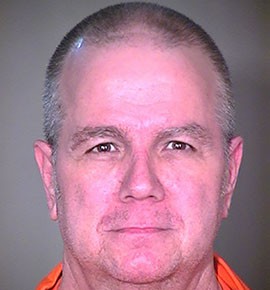Cronkite News has moved to a new home at cronkitenews.azpbs.org. Use this site to search archives from 2011 to May 2015. You can search the new site for current stories.
Double-killer gets chance to challenge death sentence after court ruling
WASHINGTON – The U.S. Supreme Court on Monday let stand a lower court’s ruling that convicted Arizona double-murderer Michael Murdaugh should get a new hearing on his death sentence.
The court, without comment, refused to hear the state’s argument that the 9th U.S. Circuit Court of Appeals had stepped “far beyond” its authority when it ruled that Murdaugh should have been sentenced by a jury instead of a judge.
Murdaugh, who pleaded guilty to two brutal beating deaths in 1995, was sentenced by a judge in 2001 to life in the first murder and death in the second.
The Arizona Attorney General’s Office said in an emailed statement that it was “disappointed the Supreme Court did not correct the erroneous interpretation” of the law in the case, but would not comment further.
But lawyers for Murdaugh said the circuit court decision was proper, and they were pleased with Monday’s decision.
“We agree with the 9th Circuit decision and we’re happy that the right to a jury was upheld,” said Paula Harms, assistant federal public defender and Murdaugh’s lead counsel.
Murdaugh was one of 21 capital defendants in Arizona who was sentenced to death by a judge, instead of a jury, before 2002, when the U.S. Supreme Court ruled that practice unconstitutional.
On review, the Arizona Supreme Court determined that 19 of those death-row inmates were eligible for resentencing by a jury. Murdaugh and another capital convict were not granted a resentencing.
The state court said the lack of a jury sentencing was “harmless” in Murdaugh’s case because “no rational juror could have found leniency and sentenced Murdaugh to life.”
One of the factors leading Murdaugh’s death sentence was the “especially heinous, cruel or depraved manner” of the killing.
He was arrested in June 1995 for killing David Reynolds, after Reynolds propositioned Murdaugh’s girlfriend, according to court documents. Murdaugh had the girlfriend lure Reynolds to her house, where he and a friend confronted Reynolds. They eventually took Reynolds to Murdaugh’s garage where they forced him in to the trunk of a car and kept him overnight while they and others did drugs.
The next day, court records say, Murdaugh hit Reynolds in the head with a meat tenderizer before beating him to death with a jackhammer spike.
Murdaugh then dismembered Reynolds in an attempt to prevent identification of the remains. Court documents say he “cut off Reynolds’s head and hands, sliced off Reynolds’s finger pads and pulled out Reynolds’s teeth,” throwing the teeth and finger pads out his truck window as he drove to bury the body. He “buried the head and hands in one shallow grave and the torso in another.”
Murdaugh was arrested within days and confessed to killing Reynolds. When police asked about a similar killing in May, when Douglas Eggert was beaten to death with a meat tenderizer, Murdaugh confessed to that death, too.
He pleaded guilty to both murders “to avoid putting his family and those of the victims through a trial.” He entered into a plea agreement in which the state would not seek the death penalty for the first murder, but could use that as an aggravating factor to seek a death sentence in the second murder.
Murdaugh also instructed his attorney not to present mitigating evidence at sentencing.
Still, the judge considered more than a dozen mitigating factors, including Murdaugh’s chronic drug use, the fact that he was on methamphetamine during the murder, that he suffered from paranoid thoughts, had admitted guilt and expressed concern toward his victims’ families. But she determined that they were outweighed by the aggravating factors, and issued a death sentence.
A year later, the U.S. Supreme Court ruled in Ring v. Arizona that capital sentencing by a judge alone denied defendants their Sixth Amendment right to a jury trial.
The 9th Circuit ordered a new sentencing, citing Ring, but the state appealed, arguing that Ring only applies to jury consideration of aggravating, not mitigating, factors. It said the appellate court exceeded its authority by expanding Ring.
The Supreme Court declined to hear the case Monday, letting the circuit court ruling stand.
The state has 90 days to seek a new sentencing hearing, Harms said, and she expects it will. She said the question is whether the state will try for the death penalty again or life in prison, which Murdaugh is already serving in Eggert’s murder.
“Nothing about the conviction is overturned, the death sentence is simply no longer valid,” Harms said. “It is now up to the state to choose.”








